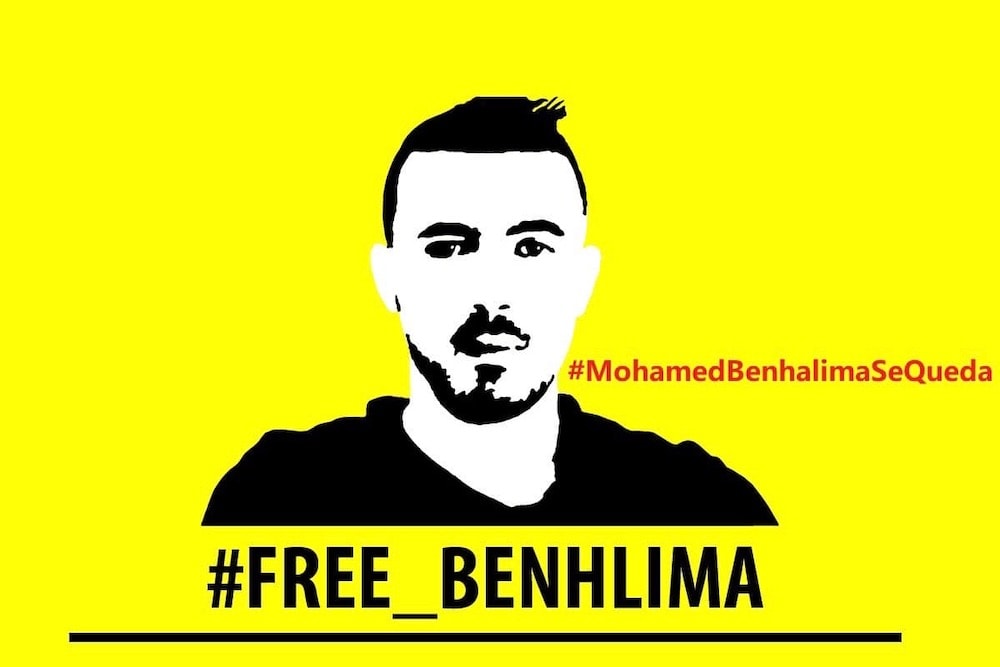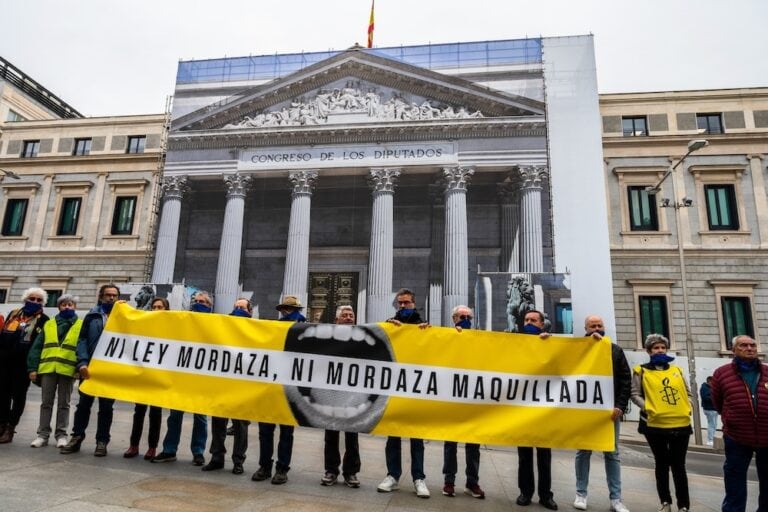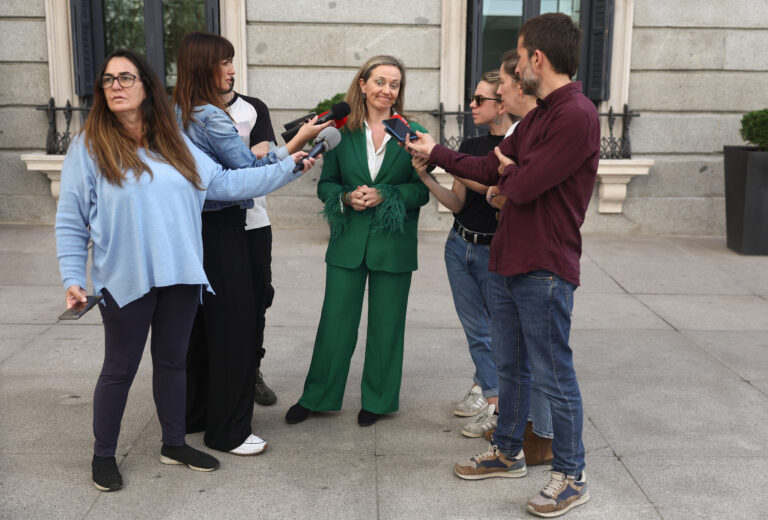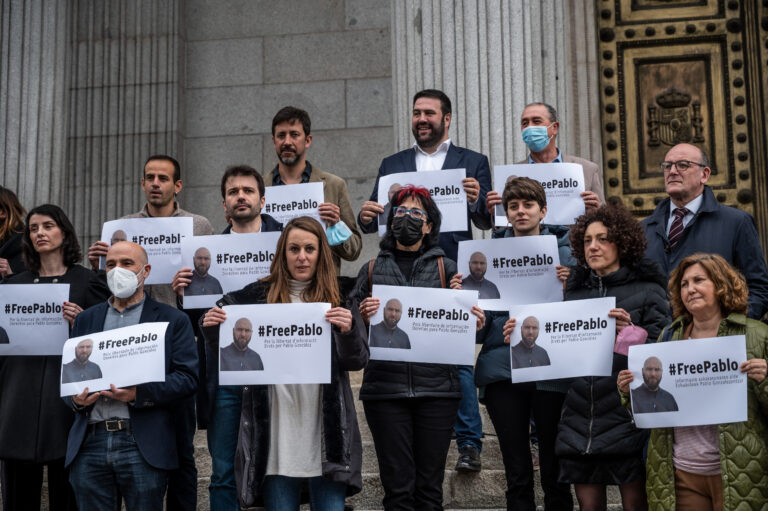Rights groups condemn Spain's deportation of Algerian activist Mohamed Benhalima who faces a high risk of torture, arbitrary detention and unfair trial in Algeria.
This statement was originally published on cihrs.org on 29 March 2022.
The undersigned organisations strongly condemn the deportation by Spain of Algerian activist Mohamed Benhalima, in the evening of 24 March 2022, despite the risks of torture and serious human rights violations he faces in Algeria, and therefore in blatant violation of Spain’s international obligations on non-refoulement. The authorities had been made aware, through civil society and legal appeals, that Mr Benhalima faces a high risk of torture, arbitrary detention and unfair trial in Algeria, where such violations are increasingly common against prisoners of opinion and peaceful activists.
Mohamed Benhalima is an Algerian citizen and a former army corporal, who became a whistleblower to expose corruption among Algeria’s high-ranking military officials in 2019. He left Algeria after receiving information that his name was on a list of wanted military officials at risk of detention by the Algerian army for their participation in the Hirak, a mass pro-democracy protest movement.
He sought asylum in Spain on 18 February 2020 and again on 18 March 2022 Spain refused him asylum both times. On 14 March 2022, authorities opened an administrative file of expulsion for infringement of Art. 54.1.a. of Immigration Law 4/2000, alleging that Mr. Benhalima took part in “activities contrary to public security or which may be harmful for Spanish relationships with foreign states”.
Spanish authorities justified the opening of an expulsion file based on Mr. Benhalima’s alleged association with political opposition group Rachad, which was listed as a terrorist group by Algeria on 6 February 2022 [1]. Spanish authorities claimed that Rachad’s objective was to infiltrate radical youth into Algerian society to protest against the Algerian government, and concluded that the activist was member of a terrorist group.
Spanish authorities did not provide any proof of use of violence, advocacy of hatred, or any other action taken by the activist that could be considered as “terrorism” in accordance with the definition proposed by the UN Special Rapporteur on the protection of human rights while countering terrorism [2]. Authorities also do not appear to have considered a context in which Algerian authorities have been increasingly levelling bogus terrorism and national security charges against peaceful activists, human rights defenders and journalists since April 2021. On 27 December 2021, UN Special Procedures warned [3] that the definition of terrorism in the Algerian Penal Code was too imprecise and undermined human rights. They stated that the procedure for registration on the national terrorist list did not comply with international human rights standards and expressed concern that it could give rise to abuse.
On 24 March around 7pm, Mr. Benhalima’s lawyers were notified of the resolution of expulsion and promptly filed a request for an interim suspensive measure at the National Court of Spain, which was rejected; however, it was revealed later that the activist was already being escorted on a plane to Algeria at the time.
On 21 March 2022, the UN High Commissioner for Refugees (UNHCR) submitted a non-public report to the Spanish government stating that Mr. Benhalima’s asylum request should be studied thoroughly in a regular procedure and not rejected expediently, arguing that the risk of torture was credible and that Algeria’s criminalisation of peaceful opposition was internationally recognised.
On 27 March, Benhalima appeared in a video broadcasted on Ennahar TV, in which he “confesses” to the crimes of conspiracy against the state and states that he was not treated badly in custody. However, the undersigned organisations call into question the reliability of such statements which might be the result of duress. In addition, Benhalima had himself released a video from the retention centre in Valencia, before his deportation to Algeria, in which he warns that such videos would not be genuine and would show that he “was subjected to severe torture at the hands of intelligence services.”
In January and March 2021, in Algeria, Mohamed Benhalima was sentenced in absentia to a total of 20 years in prison for charges including “participation in a terrorist group” (Article 87bis 3 of the Penal Code) and “publishing fake news undermining national unity” (Art.196 bis) among other charges. The overly broad formulation of both articles has been used by Algeria repeatedly to criminalise people who have expressed any form of dissent. In one of the two verdicts, issued on 9 March 2021, the judge sentenced Benhalima to 10 years in prison for his online publications, including videos exposing corruption in the army, a form of expression which is protected under the right to freedom of expression.
Spanish authorities additionally motivated the expulsion based on Mr. Benhalima’s close relationship with Mohamed Abdellah, another Algerian whistleblower and former member of the military, who also sought refuge in Spain in April 2019 and was forcibly returned on 21 August 2021 using Art. 54.1.a. of Law 4/2000, in similar circumstances and for the same motives.
Mohamed Abdellah, currently detained in the military prison of Blida, stated in court on 2 January 2022 that he had been subjected to torture and other ill-treatment upon his return to Algeria, including physical abuse and prolonged solitary confinement in a cell with no light, according to a witness who attended the hearing. He was also deprived of access to a lawyer.
Despite the strong similarities between both cases providing a compelling precedent about the actual risk of torture and other ill-treatment of activists and whistleblowers in Algeria, notably former members of the military, the Spanish government showed its determination to forcibly return someone where their physical and psychological integrity was not guaranteed. In doing so, Spain flouted critical international law obligations that forbid governments to return individuals to a country where they would be in danger of suffering torture or other cruel, inhuman or degrading treatment or punishment.
The government’s decision to expel Mr. Benhalima and the decision of the National Court not to apply a suspensive measure are in contravention of Article 3 of the UN Convention against Torture (CAT) ratified by Spain in 1987, which provides for an absolute protection against refoulement of persons in danger of being tortured or otherwise ill-treated in a State to which they are to be expelled, returned or extradited. According to the UN Committee against Torture, nobody can be excluded from this protection even if they are deemed to pose a threat to national security and are not eligible for asylum [4]. The Committee has shown that once a person alludes to a risk of torture, a State party can no longer cite domestic concerns as grounds for failing in this obligation [5], and that such considerations emphasise the importance of appropriate review mechanisms [6]. The Committee further explained that diplomatic assurances could not be used as a justification for failing to apply the principle of non-refoulement [7].
Similarly, Article 3 of the European Convention on Human Rights (ECHR) has been interpreted by the European Court on Human Rights as providing an effective means of protection against all forms of return to places where there are substantial grounds to believe that the person would be subjected to torture, or to inhuman or degrading treatment or punishment [8]. For the Court, this obligation prevails over any obligation to return, expel or extradite arising from other international or bilateral commitments [9]. Article 3 is further listed in Article 15(2) of the ECHR as a non-derogable provision, which leaves no scope for limitations under any circumstances, whether they be safety, public order or other grounds [10].
[1] Algerian Official Gazette, n°11 of 27 February 2022.
[2] Report of the Special Rapporteur on the promotion and protection of human rights and fundamental freedoms while countering terrorism, 22 December 2010, A/HRC/16/51 https://documents-dds-ny.un.org/doc/UNDOC/GEN/G10/178/98/PDF/G1017898.pdf?OpenElement.
[3] OL DZA 12/2021.
[4] See example Human Rights Committee, Khan v Canada, N°15/1994 (n 1); VXN and HN v Sweden, N°130/1999 and 131/1999
(n° 49) para 14.3; Dadar v Canada, N° 258/2004, UN Doc CAT/C/35/D/258/2004, 23 November 2005,
paras 4.4, 8.8.
[5] UN Committee Against torture, Adel Tebourski v France, No 300/2006 (n°49) para 8.3.
[6] UN Committee Against Torture, Agiza v Sweden, N°233/2003, UN Doc CAT/C/34/D/233/2003, 20 May 2005, para 13.8
[7] UN Committee against torture, Abichou v Germany, N°430/2010, UN Doc CAT/C/50/D/430/2010, 21 May 2013, para 11.5
[8] UNHCR Manual on Refugee Protection and the ECHR Part 2.1 – Fact Sheet on Article 3.
[9] Ibid, para. 2.5.
[10] European Court of Human Rights, Ireland v. United Kingdom, Judgement of 18 January 1978, Series A, No. 25, para. 162 and 163.



